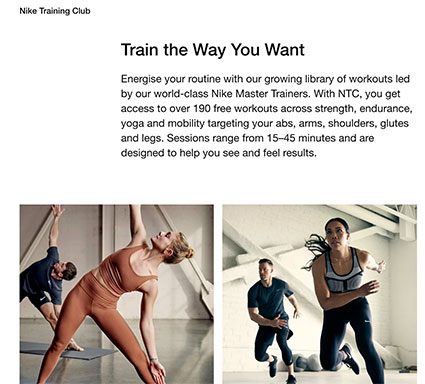
8 Fitness Tips for Students - On a Student Budget

Mishti Khatri
International student - MSc in Sport and Exercise Nutrition
I'm originally from Mumbai, India and have worked as a strength coach for young athletes and athletes returning back to sport, from injury. I completed my personal training certification from the American College of Sport Medicine. I believe that training and nutrition go hand in hand. Running, bouldering, boxing and strength training are some of my favourite activities to stay fit, and I am also glad to be a part of the Nike team in India as a runner and sport ambassador. You can follow me on Instagram at @mishtikhatri for home workouts, easy recipes and cute pictures of my dog, Butter.
Fitness doesn’t always mean weight loss or ‘chiselled abs and bulging biceps’. A fit body and mind are the key to living a healthy balanced life. As students we often put our studies and social lives before our own wellbeing without realising the long-term damage a stressful lifestyle can do. So here are a few fitness tips for students to maximise their potential by making small changes to everyday life… on a budget!
1. Exercise
Yes, I am starting off with probably the most obvious fitness tip and that is exercise! I want to highlight that if you are someone who hasn’t exercised before and are daunted by the prospect of starting, it doesn’t need to be a complex and expensive investment. You can get great benefits at home, especially if you're a beginner as the results will come much faster initially.
The NHS guidelines state that adults need at least 150 minutes of exercise (a mix of strength and cardiovascular training) per week, which isn’t asking for much considering all the value it adds to our quality of life. From reducing the risk of physical and mental disorders, maintaining bone and muscle health, boosting the immunity and ‘feel-good’ hormones like dopamine and serotonin, it really is a miracle remedy!
There are plenty of simple home workouts available online using just your body weight or simple equipment like resistance bands, skipping rope and a pair of dumbbells. My favourite is the Nike Training Club app it has a variety of workouts from Yoga to High intensity interval training (HIIT). Exercise forms are well explained and you can adjust the workout according to your level.

Team Hud, the university gym has a very warm and welcoming atmosphere, and is ideal for everyone, from beginners to serious athletes. They offer a whole range of inexpensive classes with experienced coaches. Exercise doesn’t always mean just lifting weights and running on a treadmill. Explore the options available and I’m sure you will find a fun way to stay fit! Try something new like an AMRAP workout or Pilates.
2. Join a Sports Society
Arguably the most fun and easiest fitness tip for students is to join a sports society. The Huddersfield Students' Union offers affordable membership to various sports clubs (£40-60 for the year, you can join multiple societies). It will give you a chance to explore a new sport like Fencing or Muay Thai, and even represent the university. Sports societies give you a wonderful opportunity to meet and bond with like-minded students. Apart from the physical benefits of playing a sport, I strongly believe it plays an important role in developing a well-rounded personality. At the very least international students should take part in the Global Campus Events, they host numerous regular events including sports competitions.

3. Plan outdoor/fitness activities with friends and fellow students
We often only end up meeting our friends over food and drinks, and these outings can be quite expensive and unhealthy! So why not stay fit and socialise?
Plan outdoor activities with friends, like a hike to Castle Hill or explore the Yorkshire Dales or the lovely Peak District. There are plenty of beginner to advanced level hikes and cycling routes around Yorkshire, and it's a great way to explore the county. Most of these are free and open to the public. Pack a healthy picnic and make a day out of it!

4. Skip the takeaways
According to the hungryhouse.co.uk students spend close to £1,000 per year on takeaways. Takeaways are overpriced and often not the healthiest.
The best way to save some money and stay healthy is learning how to cook. I couldn’t even cook an egg properly before coming to university but learning this skill probably one of the best things I have done for myself. I now have the independence to create wholesome homemade meals and be creative with making my favourite cuisines at home.
Even though I love cooking, I don’t have the time to do it every day with a busy schedule. So I meal prep over the weekend and store them to have over the next few days. My pantry staples are chicken breasts, fish, prawns, turkey mince, lots of fresh colourful vegetables and fruits, Greek yogurt, bread, noodles and rice. Dishes like stir-fry’s, one pan roasts and curries are some of my go-to meals. I have a ‘Recipes’ highlight tab on my Instagram page - @mishtikhatri where you can find some of my favourite recipes.
Being prepared with meals and snacks also helps you make better choices. Rather than grabbing a bag of crisps or a sugary drink, you can reach for a protein bar or some fruit! Though the calories may add up to the same, the nutrition value varies. This doesn’t mean that you shouldn’t take a break and enjoy a takeaway occasionally. It is about creating better skills and choices that can be a part of a healthier happier lifestyle.
5. Increase your NEAT
Non-Exercise Activity Thermogenesis (NEAT) is the energy expended while doing any activity apart from sleeping, eating and intentional exercise. Increasing your NEAT increases the amount of calories you burn in a day through daily living and elevates your metabolic rate.
Sedentary lifestyles need to be reversed. Walk or cycle to places as much as possible, take the stairs, and walk around for 5-10 minutes for every hour of sitting. This is the perfect fitness tip for students to save money and improve their health at the same time!

6. Don’t drink your calories
Frappes and smoothies are often loaded with sugar and may contain more calories than you think. A caramel frappe at Starbuck can be around 400-600 calories, which is the size of a meal! When you drink your calories, you don’t feel as satisfied as when you eat and nor does it keep you full for too long.
Even when it comes to soft drinks, you are better off having the zero calorie or artificially sweetened options than the full sugar one, especially if you have weight or fat loss goals.
This fitness tip is valuable for students as we tend to rely on these drinks while getting through a long night of revision. If you're having a night out opt for low-calorie mixers and keep a check on your drinks, as calories from alcoholic beverages can quickly add up. Make sure to drink enough water throughout the day and stay hydrated. Don’t try to suppress or ignore your natural hunger cues by consuming pops or caffeinated energy drinks. Listen to your body and nourish it!
7. Add… don’t subtract
One of my favourite fitness tips is thinking about what you can add to your lifestyle rather than eliminating, especially if you are just starting out with your journey. Having pizza for dinner? Add a side salad or some roasted vegetables. That way you can enjoy your pizza in moderation and increase the nutrition value of your meal. Think about ways you can add more colourful fruits and vegetables to your day as they are loaded with antioxidants, vitamins and minerals. Aim to get at least 2 servings of fruits and 5 servings of vegetables every day.
Focus on good habits and lifestyle practices that you can add rather than being extremely restrictive and cutting out food groups that may not be sustainable in the long run. Think about the previous fitness tip and how you can add more movement to your day too!

8. Sleep but don’t snooze
Sleep deprivation is an epidemic that is crippling our generation. We are constantly battling that feeling of fatigue and being overworked but can’t seem to stop. Our addiction to screens doesn’t help matters either. The blue light emitted from our gadgets hampers the quality of our sleep. So we then consume copious amounts of coffee and energy drinks to get through the day and the remnant caffeine in our system doesn’t let us sleep well either, entering a vicious cycle.
If you take away one thing from this article, I would want it to be this. We need at least 8 hours of sleep every night. Sleep offers a multitude of benefits; maintaining our weight, hormonal balance, recovering the nervous system and the muscles from the day’s work are just some of them.
Some ways you can ensure you sleep well are:
- No screens two hours before bed.
- Create a night time routine that helps you destress.
- Don’t have caffeinated drinks 6-8 hours before you plan to sleep.
- Avoid a very heavy meal right before trying to sleep.
- Don’t keep hitting that snooze button in the morning, it just builds but sleep inertia.
I strongly recommend reading Dr. Matthew Walker’s book Why we Sleep for more insight in this topic.
For a more brief understanding, check out Dr. Ian Dunican’s article and free webinar with Ryan Parker about optimising sleep.
It’s our much needed ‘system update’… but make sure you don’t keep hitting the ‘remind me tomorrow’ button!
Summary of 8 Fitness Tips for Students – On a Student Budget
- Exercise 5-6x a week for at least 30-45 minutes.
- Join a sport society and get involved with the university sporting competitions and events.
- Plan outdoor activities with friends like hikes and cycling tours.
- Skip the takeaways, and explore your inner chef.
- Increase your non-exercise caloric expenditure by boosting daily movement.
- Don’t drink your calories, it’s not as satiating as solid food. Choose sugar-free drinks over the full sugar options.
- Add healthier wholesome home-cooked meals with ample fruits and vegetables, rather than looking for ‘quick-fix’ fad diets which are restrictive and may eliminate major food groups from your diet.
- Get 8 hours of good quality sleep every night and aim to practice better sleep habits.
Think about these fitness tips as a few guidelines on getting fit and healthier. Do things that you will be able to practice in the long run. One ‘bad’ day is not going to throw off your progress, so approach it as a journey that is not going to be linear. More importantly, make it your own and enjoy it!
Student life in Huddersfield
What is life like as a student in Huddersfield? Hear it straight from our current students as they write about their student experience.
Which University?
Read more articles from current students at Huddersfield describing how they chose their course and why.